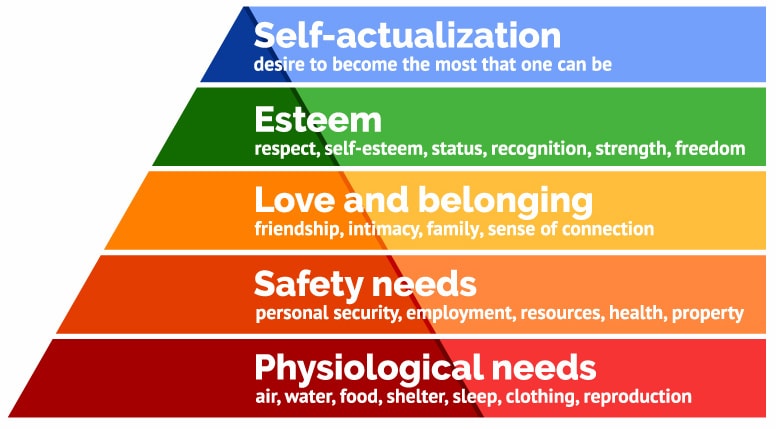For years, managers have learned how to motivate employees by using Abraham Maslow’s model of motivation. This same model can help us understand why employee morale may be severely damaged during transition. With this understanding, we are better equipped to facilitate the shift with least damage.
In Maslow’s ranking of needs, each person starts at the bottom of the pyramid and is motivated to fill physiological needs for food, water, air, etc. When this class of needs is adequately met, the next higher need, security, becomes the primary motivation. This need is filled by locks on the door, banks to keep our money safe, police, fire departments, national defence, etc. After that comes the social need for family, friends, community, and so on. We are not only satisfied with belonging and being accepted by other, but we also need to feel good about ourselves and our role in society. This will satisfy our esteem needs. The ultimate need is for self-actualization. This is the optimal realization of your talents, competences and potential.
So, let's have a look on how organizational change affects humans according to Maslow's Hierarchy of Needs.

Physiological Needs
These refer to basic physical needs like drinking when thirsty or eating when hungry; hence food, shelter, clothes, etc.
Maslow considered physiological needs to be the most essential of our needs. If someone is lacking in more than one need, they’re likely to try to meet these physiological needs first. For example, if someone is extremely hungry, it’s hard to focus on anything else besides food. Fear of job loss generates fear of losing the income needed to provide basic needs. Change is instinctively judged by the extent to which it is likely to affect my ability to meet the basic needs for myself and my family.
Safety Needs
Once people’s physiological requirements are met, the next need that arises is a safe environment. Our safety needs are apparent even early in childhood, as children have a need for safe and predictable environments and typically react with fear or anxiety when these are not met. Maslow pointed out that, in adults living in developed nations, safety needs are more apparent in emergency situations (e.g. war and disasters), but this need can also explain why we tend to prefer the familiar or why we do things like purchase insurance and contribute to a savings account. Similar to basic needs, organisational change is judged by the extent to which it causes a threat to my safety needs. Some workers may worry that they will lose their company housing or that they will not be able to pay their house loans. Employees may instinctively (and often irrationally) judge the change in terms of the extent to which they may occur financial losses as a result of the change.
Belonging and Love Needs
The workplace is the main source of social interaction and friendship for many employees. The need to belong, the need to be wanted and the need to reach out to others for whom you care. An employee’s response to change in the workplace will once again instinctively include the judgement of the extent to which s/he will be affected in terms of ‘social fit’ and possible losses of ties and belonging. Familiar ties and emotional support are lost when friends and co-workers are transferred or laid off. Severe family distress often occurs for workers and this can be an additional concern for them. Family celebrations, vacations and other plans may be postponed or altered due to financial uncertainty.
Esteem Needs
The esteem need is filled both by recognition and appreciation from others, as well as from a sense of one’s own value. A sense of having no control over an uncertain future and doubts about one’s capacity to adjust to new conditions may engender a sense of incompetence, obsolescence, and plummeting self-esteem. This can be especially severe for those whose sense of self-worth is closely tied to their current job status, as it is for most of us. Layoffs or restructuring may initially lead employees to feel that they are devalued by the organisation and to fear the future. The role in the family is also affected, as the sole provider may feel that s/he let the family down.
Self-Actualization Needs
Self-actualization occurs when a person is able to do fulfilling, meaningful, and creative work that utilizes one’s best talents, in whatever field of endeavour s/he may pursue. If an employee is experiencing some combination of the reactions outlined above, such as guilt, anger, passivity, etc. Little sense of self-actualization is likely, until they are addressed.
In summary, employees who are involved in significant change may feel threatened. As we have already established that this feeling of fear accumulates in all the levels of Maslow’s hierarchy of needs, it is little wonder that they can sometimes appear to be in a state of shock. They feel that their world has been turned upside down!